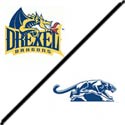John Illig is the Middlebury squash coach.
 Middlebury, VT — Sometimes (not often) it happens, mid-match, that you know you’re in one for the Ages. Okay: so, not one for the Ages, of course, but at least one that’s going to personally resonate. I want to believe I’d have written this piece even if my men’s team had lost 4-5 yesterday against Drexel instead of winning.
Middlebury, VT — Sometimes (not often) it happens, mid-match, that you know you’re in one for the Ages. Okay: so, not one for the Ages, of course, but at least one that’s going to personally resonate. I want to believe I’d have written this piece even if my men’s team had lost 4-5 yesterday against Drexel instead of winning.
In his quite enjoyable squash book “Run to the Roar,” Paul Assaiante describes a feeling of calm resignation that came over him late in his February 22nd, 2009, Trinity match against Princeton when a moment came when it seemed certain that his Bantams were about to experience the unthinkable and lose. Paul’s feeling of calm almost bordered on relief that The Streak was over, and that history had been made. But then (on that day, anyway) the loss never occurred.
Like that, I reached a point late in yesterday’s Middlebury-Drexel men’s squash match on our home courts when I suddenly and uncharacteristically found myself devoid of any emotion. I just watched the proceedings unfold. I had a beautiful period of Zen. It was perfect Kipling: “…If you can meet with Triumph and Disaster / And treat those two impostors just the same…”
WILKINSON
Drexel University is a team that’s quite clearly on the rise. That’s no secret to anyone who’s paying attention. But what gives it away? Could it be the team’s newly instated varsity status, or that University President John Fry has a special place in his heart for the game of squash? Or perhaps it’s that Drexel is doing a remarkable job as multi-year host for squash’s US Open? Or maybe, just maybe, it’s because they have in John White a head coach who’s the recent former number-one squash player on Earth? Or that they’ve begun the tested, successful intercollegiate squash model of recruiting talented players from across the globe?
The assistant coach at Drexel is Sean Wilkinson, from Zimbabwe. He’s a young man with a heart of gold, the hunger of a lion, and a personality the size of a skyscraper. Those traits, along with his squash talent, were why I had recruited Sean to play on my former Bates College team several years ago. I was lucky to have Sean on my team back then, and like metal to a magnet his presence ushered in the emergence of Bates squash. Sean was elected captain by his teammates for his sophomore, junior, and senior years, making him the only 3-time captain that I’ve had in my 22 years as a college head coach. After graduating, Sean became friends with Peter Nicol after their having worked the Williams and Dartmouth summer camps together. Sean then worked two years in Milan, Italy, as the head pro at Nicol’s club there. A year in the Ivy League as Stuart le Gassick’s assistant at Brown came next for Sean, along with collaboration on Nicol’s SquashSkills web-site and business. And then came last year’s Drexel offer from John White. It was worth leaving the Ivy League for. Through my lasting friendship with Sean, he’s been my inside source on All-Things-Drexel-Squash, and I’ve been thrilled over what has and is going to transpire there. At the end of Sean’s e-mail sign-off signature is the following statement in large font (and quite possibly all-caps?): “I Am A Dragon.”
PRE-MATCH
In what sport is it that one who was the best player in his neighborhood can stand shoulder-to-shoulder with one who was very recently the best player in the world? My first taste of this uniqueness in squash came way back in 1982 when as a college freshman at Trinity (before I’d transferred to the University of Rochester) I was new to the sport and thus improbably found myself on court and playing a game against the #1-ranked professional hardball player, Mark Talbott, who would occasionally stop by Trinity to hit with my All-American teammates Doyle, Georgie, and Creegan. “Wow, how weird,” I’d thought to myself back then. Fast-forward MANY years later to my days as an intercollegiate squash coach and a scene at a post-dinner coaches’ party where I sat over a beer at a small table with my friend and Bowdoin assistant coach John Montcure, Esq., when suddenly down at our table to join us sat former world #8 Hansi Wiens of Dartmouth. Great. Fine. Then minutes later sitting down to join us came former world #3 Martin Heath, of Rochester. Still fine, I suppose, but getting weird now. So then of course to top it all off, straight-away former world #1 John White sat down with us. Montcure is a former wrestler. And I am a former (and current!) Best-In-My-Neighborhood squash player. So Montcure and I just looked at each other and laughed, while my thoughts went something like: “THERE IS NO REALITY IN ANY OF THIS!” when the best in the world can just walk into a room and sit down next to you.
Drexel’s head coach White, and assistant coach Wilkinson (my friend and former player), entered the Middlebury College gym at 9:00 AM on Sunday, along with 24 of their men’s and women’s squash players, in preparation for our 10:00 AM match. It was not lost on me that we were about to have a very close men’s match, as I’d been scouting out their early season results, and for sure they’d scouted us, too. On paper, our women’s match would be less close, and indeed that ended as a 7-2 Middlebury win. Sean tells me that additional quality women’s players are headed to Drexel next year for 2013-2014, which is excellent and exciting news for CSA women’s squash. But on this day all drama sat with the men.
White and Wilkinson sat on the sofas in my office, and to poke fun I said,
“See, I don’t have a single photo on my wall that commemorates Sean as one of my old players.”
John White said, “Yeah, well at Drexel we don’t put up any photos of Sean on the wall, either.”
Funny. Next, I walk them down the back hallway of our gym to look out a set of glass doors at the multiple pieces of heavy machinery that are sitting inside a huge hole in the ground.
“THAT is our new squash facility,” I said, showing them how construction has already begun on our new 9-court Middlebury Squash Facility that I’ve been awaiting for six years. “The doors will open in the fall.”
“Cool.”
MATCH
Selfishly, I was hoping that fatigue would hinder and hamper and in all ways cause terrible fits for the Drexel men, as they’d played Penn that previous Wednesday (3-6 loss), then Amherst Friday (6-3 win), then both Williams and Trinity on Saturday (1-8; 0-9) before facing us Sunday morning. We’d had a less-tiring week, having only played Navy (1-8 loss) on Friday and Bowdoin (5-4 win) on Saturday.
Through pre-match scouting, Drexel’s 7, 8, and 9 seemed vulnerable while their top 6 appeared formidable by our standards. Four out of Drexel’s top-five hailed from far-off – – Egypt, Australia, Sri Lanka, and Luxembourg — while practically all their Americans were from Philly. It seemed that our match could be decided by the middle spots in the line-ups.
Playing the 3-court-system, players #3, 6, and 9 went on first. Drexel took the #3 and the #6 matches to go up 2-1, which didn’t bode well for the Panthers, as I’d forecasted the #6 match to be pivotal. Things rapidly became increasingly dire when Middlebury’s undefeated #2, Parker Hurst, lost 0-3 (putting Parker at 5-1 on the season), and Middlebury’s #5 Robert Galluccio went down 1-2 in games and 2-8 in the fourth. At that moment it appeared that the #24 ranked Drexel Dragons were well on their way to taking down the #13-ranked Panthers.
If Galluccio lost just 3 more points, then Drexel would be up 4-2 (after Middlebury’s win at #8), and in need of just one more win out of the final three matches that were left to be played: numbers 1, 4 and 7. Things looked bad indeed; it was precisely then when I had my Assaiante vs. Princeton-2009 feeling of resignation. Zen took over. Emotions faded away. I would be happy for Drexel. I would be happy for my good friend Sean. Life goes on.
But… then suddenly Galluccio faught back.
With some gutsy court coverage combined with a series of winning forehands that were off-paced and severely-angled low and away, Galluccio improbably came all the way back to win 9 of his next 10 points for an 11-9 fourth-game. He breezed through his fifth-game for a victory in the #5 spot by the score of: 11-4, 2-11, 10-12, 11-9, 11-5. The worm had turned.
Drexel then won a quick match at #4, and Middlebury won quickly at #7, giving both teams 4 match victories with just the #1’s left to play.
DOLAN
With his own athletic and unique style, Middlebury’s #1, Shrek-like senior co-captain Jay Dolan takes everything early and hits low and hard. Off to a lightning-fast start, Dolan won 11-5, 11-8 in the first two games, turning the Middlebury fans giddy at what now looked like an imminent team win snatched from the jaws of defeat.
I was surprised that Jay could even play his match at all, for he had turned his ankle on court just the night before. Jay had gotten his feet tangled with Bowdoin’s #1 Andrew Hilbolt on the fifth rally of their match and went down hard, clutching his ankle in pain. Slow to get up, he took an injury time-out. He got wrapped by a trainer and tried to resume his match, but he could only play two more points in great pain before holding out his hand to give a disappointing injury-default to his Bowdoin opponent. That match had been played at Dartmouth, and Jay rode shot-gun in the van, icing his ankle with his shoe off and sleeping (or deep in thought) for the bulk of the ride home to Vermont. Nobody mentioned his ankle.
But so far Jay seemed to be doing all right, even though I could detect his almost imperceptible limp while walking to the drinking fountain on his 90-second breaks between games. Down 0-2 with the overall match at stake, Drexel’s talented Egyptian freshman Ibrahim Bakir then suddenly seemed to take an interest in the goings-on, and damn if his shots stopped finding the tin. With impressive early racquet preparation, an economy of movement, a new-found cool, and an uncanny ability to corner Dolan into stroke situations, Bakir looked like a rejuvenated player and took the third and fourth games 11-8 and 11-9 to even their match at 2-games all.
Dolan-Bakir’s fifth and final game found Dolan out to an early 5-0 lead, only to have Bakir systematically claw back and even the score at 8-all. Both teams were screaming. There were many lets called. Drexel’s #2, Australian Justin Singh (the only men’s player to transfer and follow John White from F&M to Drexel), did a masterful and sportsmanlike job of making difficult calls correctly time and again. From 8-all, Dolan suddenly hit to perfect length twice to go up 10-8, and then the match ended on a stroke against Bakir, for Dolan’s 11-5, 11-8, 8-11, 9-11, 11-8 win and the 5-4 team win to Middlebury.
“Good match,” says John White in the post-match handshake.
“Thanks. Next year you beat us 9-0,” I say, though I truly hope that doesn’t happen.
I see Jay’s girlfriend and I’m reminded in my mind’s eye of the image of Jay limping to get to the drinking fountain on the 90-second breaks. I ask her how Jay was even able to play the match let alone walk. She says,
“I don’t know: his ankle was swollen so badly last night that he could hardly stand.”
Jay Dolan is Superman.
A little bit shell-shocked, because for a long while it had looked as if they’d been destined for victory, Drexel asks us where’s a good place to eat in town, and then they depart on their bus for a quick bite and the long ride home to Philly. Next day, Wilkinson e-mails me. He says just: “Yo – thanks for playing us mate. It was a really good experience for our players to lose such a close match. Our first really close loss for the program – good for all our guys.”
Even when they lose, it’s good.
Indeed, it is good to be a Drexel Dragon. And good to be a Middlebury Panther. It’s good to be a squash player and to be in the CSA where we all go through these emotions. It means that we care.





